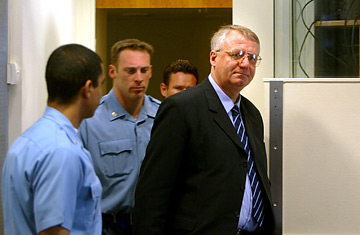
Serbian ultranationalist Vojislav Seselj is seen during his initial appearance at the Yugoslav war crimes tribunal in The Hague, Netherlands.
The trial of Serbian ultranationalist leader Vojislav Seselj may be the last of the major Balkan war-crimes trials to be heard by the Hague Tribunal, but it is also unique for other reasons: Unlike the rest of the politicians and military commanders indicted by the Tribunal, Seselj is not accused of physically hurting anybody, or of being part of a chain of command that ordered mass murder and other abuses. Instead, the politician whose trial began Wednesday is accuse of inciting war crimes by churning out inflammatory speeches and disseminating "poisonous ideas."
The ambitious indictment may be the last major case before the Tribunal, which is expected to close its courtrooms by the end of 2008 and complete its appeals proceedings by 2010. But there are serious concerns that the new trial could become a mockery of justice, and even help Seselj score some political points at home, where he is widely regarded as a hero, and where he still wields considerable political power as leader of the largest party in the legislature.
As a close ally of late Serbian President Slobodan Milosevic, who died during his own trial in 2006, Seselj is indicted for inciting crimes against humanity, including murder, torture and the persecution of Croats, Muslims and other non-Serbs during wars in Bosnia and Croatia in the 1990s. Seselj is nonplussed by the charges, claiming the trial is purely political. "I am being tried for atrocious war crimes that I allegedly committed through hate speech as I preached my nationalist ideology that I am proud of," he said at a pre-trial hearing. "I have no other involvement in these crimes expect for what I said or wrote."
Although the defendant appeared calm during the first day's proceedings, his long history of defiant, often aggressive behavior suggests that the trial could be a turbulent affair. During five years of preparation for the trial, he tossed obscenities at prosecutors and court clerks during hearings, refused to use a computer and insisted that all court papers (some 250,000 pages) be translated in Serbian Cyrillic (Serbs use both scripts). Like Milosevic, Seselj insisted on being his own defense lawyer, and when the court attempted to assign him an attorney, he went to a 28-day-long hunger strike, until all his demands were granted.
Nationalism is on the rise again in Serbia due to the imminent secession of Kosovo, the mostly ethnic-Albanian province which is seeking independence from Serbia with the backing of the West, while Belgrade — backed by Moscow — remains fiercely opposed. Following the footsteps of Milosevic, Seselj is also expected to use the courtroom as a platform for further hate speech, thus advancing the electoral prospects of his deputy Tomislav Nikolic, who is running for president in Serbia's January elections. Nikolic, the caretaker of the ultranationalist Serbian Radical Party in Seselj's absence, is running neck-and-neck with incumbent President Boris Tadic, a pro-Western democrat. The radicals hope that the emotions stoked by Seselj's trial, which is being broadcast live on Serbian state television, will help Nikolic win.
